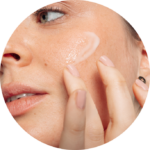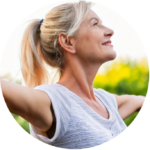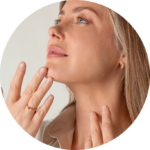Essential oils have long been prized for their therapeutic effects and powerful natural fragrance. I hope more skincare companies decide to make the switch to essential oils and eliminate synthetic fragrances containing toxic ingredients.
Although there are many essential oils that are fantastic for skin and overall health, I’m focusing on my six favorite oils.
First, though, it’s important to understand how to use essential oils safely. When used properly, essential oils are powerful and healing. However, they can also be very strong or may lead to sun sensitivity. Follow my safety tips to ensure you reap the benefits of essential oils and avoid potentially negative side effects.
Tips for Safely Using Essential Oils
- Check for purity. The purity of essential oils varies greatly, so look for oils with the absolute highest standards. For example, some essential oils are extracted via harmful practices. Before purchasing, ask questions about the extraction process, purity, and concentration.
- Do a patch test. Some people are sensitive to essential oils and may develop contact dermatitis or skin irritation. If you have sensitive skin or tend to react easily, it’s best to do a patch test by applying the skin care product with essential oils to a small area on your inner forearm and then place a band-aid over the test area. If you develop a rash, redness, or itchiness within 24 hours, then you may have a sensitivity. Reconsider using the product elsewhere on your body.
- Start small and simple. Generally, it’s best to start with 2 – 3 drops per application. I like to use a carrier oil such as coconut oil, almond oil, or jojoba oil and mix 1 or 2 drops essential oils in 2 – 5 Tablespoons of oil to start. I don’t generally recommend people apply straight essential oils (without diluting) when they’re first trying it out. Some oils are stronger than others, so you’ll want to dilute them even more.
- Use caution in the sun when using citrus essential oils. Furanocoumarin is a chemical component found in citrus peel that causes sun sensitivity (easy burning or excess pigmentation). There is the potential for serious damage to the skin after exposure to direct sunlight. In The Spa Dr. skincare products (Daily Essentials Steps 2 and 3), we use furanocoumarin-free oil, making these products safe for use with sun exposure. If you use skin care products with citrus essential oils, it’s important to make sure that they’re furanocoumarin-free.
- Use caution when using straight (undiluted) essential oils therapeutically. This is particularly important if you are pregnant, nursing, or want to use essentials on your baby or child. Certain components of essential oils, such as ketones, can be great for healing but can be neurotoxic to sensitive patients, including pregnant women, infants, and those with seizure disorders.
- Work with a specialist. If you have specific health or skin issues, it’s best to work with a qualified health care provider to help ensure you get the best care possible and your condition can be safely monitored. If you want to use essential oils therapeutically, consider working with someone well trained in essential oils.
Here are 6 of my favorite essential oils for skin:
1. Tea Tree Oil
Tea tree oil has antimicrobial and anti-inflammatory properties and is well-known to help reduce breakouts in patients with mild-to-moderate acne. In addition, the research shows tea tree oil to be effective at addressing seborrheic dermatitis and chronic gingivitis (gum disease), as well as speeding the wound healing process. Because of its antifungal and antiviral effects, tea tree oil may also help with warts and fungal infections (such as athlete’s foot and nail fungus). It has even been shown to have antibacterial activity against MRSA and may be helpful as an adjunct therapy.
2. Ylang Ylang Flower Oil
This beautiful essential oil has an exotic sweet smell and a euphoric, sedative effect on the nervous system, making it an effective relief for tension and stress. Topically, ylang-ylang oil helps with sebum-balance for both overly dry and overly oily complexions. It has an amazing ability to help maintain proper moisture levels by preventing skin’s water loss which, in turn, makes the skin appear resilient and smooth. It also has a soothing effect. It is one of the star oils in The Spa Dr.’s Daily Essentials proprietary 100% organic, natural, essential oil blend.
3. Bergamot Fruit Oil
This oil has a lovely natural fragrance as well as antiseptic and antibacterial properties. It can help regulate sebum secretion and has been known to even out skin tone and promote wound healing. Blemishes of all types benefit from its topical application. Since this is a citrus oil, it’s important to be careful of sun exposure after using this oil. You can use it in the evenings in small amounts, but some people continue to have sun sensitivity effects 24 hours after use. That’s why, with The Spa Dr. skincare, we use Furanocoumarin-Free, also referred to as Bergaptene-Free, bergamot oil.
4. May Chang Peel Oil
This oil is widely used in Traditional Chinese Medicine for its anti-congestive, antiseptic, and calming benefits. In skincare, it helps address oily skin and breakouts thanks to its astringent, antimicrobial, anti-inflammatory action. May Chang Peel oil is known for its deep-cleansing, pore-reducing effects without irritating or drying out the skin. In addition to soothing and healing the skin, its amazing scent makes it the perfect natural fragrance, which is why we also include this in The Spa Dr.’s Daily Essentials proprietary 100% organic, natural, fragrance.
5. Clary Sage
Clary sage oil contains natural antimicrobial agents, making it helpful in addressing wounds and skin infections. Research shows it can help fight certain Staphylococcus infections, which are common bacterial causes of skin infections. (Postepy Dermatol Alergol) Skin infections are common, but it is important to see your doctor if your infection is serious or continues for more than a few days without improvement.
6. Lavender
This popular essential oil is known for its stress-reducing, soothing, and calming properties as well as for its antimicrobial activities against bacteria, fungi, and yeasts. Research shows it also has anti-inflammatory and immune boosting effects. It also offers pain-reducing and wound-healing properties, making lavender one of my favorites in skincare and skin healing treatments.
As I mentioned before, there are many more essential oils with therapeutic and naturally fragrant properties. For example, peppermint oil, lemon balm, lemongrass, jasmine, and frankincense have skin-enhancing and healing benefits. I could go on, but these six give you a great place to start using essential oils in your skincare today. Enjoy!








Reader Interactions
What essential oil would you recommend for rosacea? Thank you!
Aloe Vera, Lavender, and Roman or German chamomile